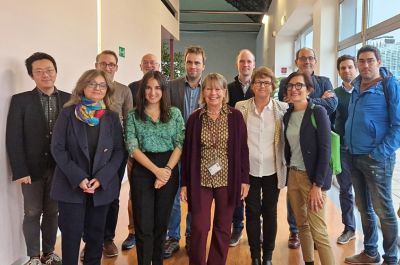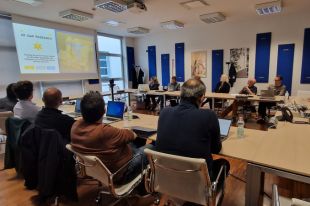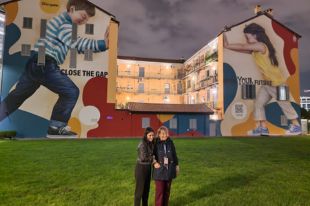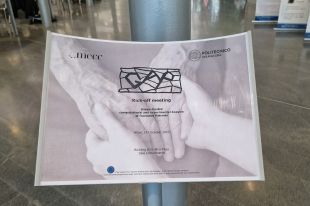
On October 23rd, 2023, the kick-off meeting of the GAP MSCA Doctoral Network project marks the initiation of a ground-breaking endeavor aimed at revolutionizing the approach for addressing the fragility fracture crisis through a comprehensive multi-scale perspective.
As individuals age and contend with bone pathologies, the human skeletal structure undergoes an increase in brittleness, rendering it more susceptible to damage. At the macro-scale, the identification of fragility is reliably conducted through clinical practices; nonetheless, conventional clinical tools exhibit a predictive accuracy limited to 70% for fractures. Hence, a thorough exploration of bone micro-architecture emerges as a crucial avenue for unraveling the mechanisms of damage, enhancing the dependability of fracture risk indicators, and enabling more precise diagnoses of bone pathologies. This depth of understanding surpasses the current state-of-the-art approaches, and it is precisely in this realm that the GAP project assumes its pivotal role. GAP project will act on both the prevention and treatment side, designing novel pathways for personalized healthcare.
The resounding success of the kick-off event, hosted by the Department of Mechanical Engineering, was marked by a confluence of visionary leadership, dynamic collaboration, and a shared commitment to educate young and talented doctoral candidates within the framework of bone fragility. Prof. Laura Vergani, as the GAP coordinator, together with Dr. Federica Buccino, delivered an impassioned opening address that not only elucidated the project grand vision but also served as a rallying point for the diverse group of participants. Her articulate presentation set the tone for the meeting, emphasizing the critical need to envision novel pathways for addressing the clinical and scientific issue from a multi-disciplinary view.
Throughout the meeting, participants from eight academic partners, two research centers, and representatives from clinical and social institutions actively engaged in discussions, fostering an environment of open dialogue and idea exchange. The interactive sessions facilitated a deeper understanding of the intricacies involved in the project's objectives, which go beyond conventional fracture diagnostics and treatment methods. A dedicated session, coordinated by Dr. Renata Erroi, deepened the administrative aspects related to doctoral candidates’ recruitment and the financial parts of the project. Within GAP framework, eleven doctoral projects are sketched, involving two periods abroad for each early stage researcher and merging numerical and experimental high-level training. Dedicated schools and networking events will be hosted in the network institutions during the 48 months of the project.
A pivotal aspect of the meeting was the thorough exploration of the interdisciplinary nature of the project. The collaboration between partners specializing in mechanics (such as Trinity College Dublin and POLIMI), biomedical engineering (TU Eindhoven and TU Delft), computer science (IMPAN and NTNU), and biological and biochemical sciences (EMPA and CNRS) was emphasized. This diversity in expertise highlighted the transversal competencies within the consortium, underscoring the holistic approach necessary for tackling the fragility fracture crisis comprehensively.
The success of the kick-off meeting was further accentuated by the strategic partnerships forged with key entities such as the ELETTRA synchrotron, offering unparalleled high-resolution imaging capabilities, the clinical expertise of IOG, and the societal perspective provided by CittadinanzaAttiva. Each partner's role was clearly delineated, ensuring a symbiotic relationship that maximizes the collective impact of the consortium.
Beyond the tangible outcomes, the meeting instilled a sense of collective purpose and enthusiasm among the consortium members. The commitment to educating next-generation of scientists in a combined high-level experimental and numerical approach was underscored, laying the groundwork for the project's future success. As the GAP MSCA Project embarks on this ambitious journey, the success of its kick-off meeting not only serves as a testament to the robustness of its foundation but also heralds a new era in multi-scale fracture research, poised to make significant contributions to the advancement of Europe healthcare system.



